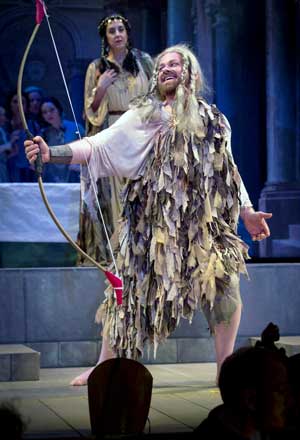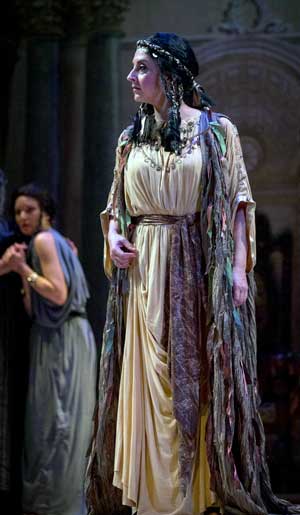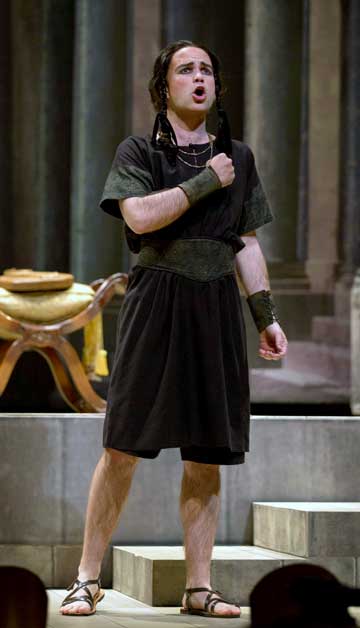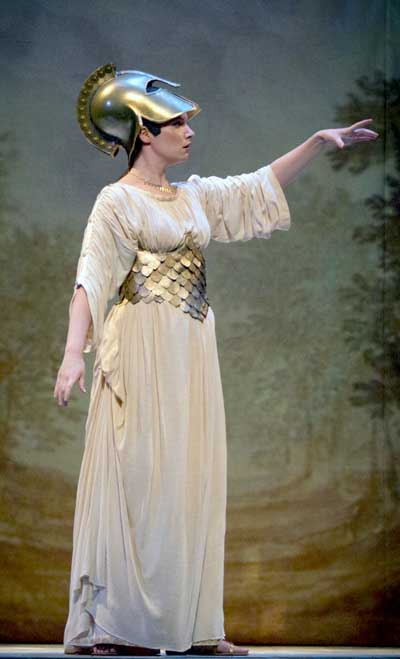Opera (1639)
It Ritorno d’Ulisse in Patria (The Return of Ulysses To His Homeland)
by Claudio Monteverdi
Libretto by Giacomo Badoaro
Paul O’Dette and Stephen Stubbs, Musical Directors
Gilbert Blin, Stage Director; Robert Mealy, Concertmaster
Anna Watkins, Costume Designer; Gilbert Blin, Set Designer; Lenore Doxsee, Lighting Designer
Ulisse:
Boston University Theatre, Boston
June 10, 2015 at 7pm
June 12, 2015 at 7pm
Festival:
Various locations around Boston
June 7-14, 2015
With Mary-Ellen Nesi (Penelope), Colin Balzer (Ulisse), Zachary Wilder (Telemaco), Mireille Asselin (Minerva),Danielle Reutter-Harrah (Melanto), Aaron Sheehan (Eurimaco), Laura Pudwell (Ericlea), Jason McStoots (Eumete, Giove), Amanda Forsythe (Giunone), Nell Snaidas (Amore), Erica Schuller (La Fortuna), John Taylor Ward (Il Tempo), Christian Immler (Antinoo), Neptune (Matthew Brook)

in “Ulisse”
Photo: Kathy Wittman
Courtesy of Boston Early Music Festival
The story here is pretty much as it is in The Odyssey’s account: manipulated by a panel of gods, especially Neptune (Matthew Brook), Ulisse (Colin Balzer) spends ten years after the Trojan War roaming the seas until he gets back home. With ten years at the Trojan War, he hasn’t been home in twenty, but, despite insistent pursuits by a tangle of suitors, Ulisse’s wife, Penelope (Mary-Ellen Nesi), remains faithful. Arriving at Ithaca and dressed up as an old shepherd, Ulisse begins to insinuate himself back into the home scene, gradually challenging then overcoming the small army of suitors. Finally, by revealing a secret about their bed which nobody else could know, Ulysses convinces Penelope it’s the real him and things wind up happily.

in “Ulisse”
Photo: Kathy Wittman
Courtesy of Boston Early Music Festival
There are no real departures from the traditional story here, which makes for a fairly straightforward narrative foundsation. Without the humorous machinations of Poppea , the story, though dramatic, is generally less entertaining. Nonetheless, in the hands of the extremely capable singers and musicians of the Boston Early Music Festival, the performance is an utter delight.
The libretto by Giacomo Badoaro does make a lot of hay by the various gods about Ulisse’s destiny, and there is plenty of time during which the various dramatic points are attenuated. It takes a long stretch to show the annoying insistence of all the suitors and to have Penelope’s handmaiden try to convince her to play around a little. As well, it takes a while for Ulisse to land in Ithaca, befriend a shepherd, Eumete (Jason McStoots), get back in contact with his son, Telemaco (Zachary Wilder), and to gradually prove his mettle on the home turf.
The music is rich, though subtly nuanced. The attenuations of tonality are in clear evidence here and the pre-eminence of recitative. Embellishing that, there are numerous significant and durable harmonic passages delivering persistent and penetrating accounts in multiple voices, and, in this respect, Ulisse satisfies perhaps even more than the musically enchanting, entertaining and vivid, but more soloistically-oriented, Poppea.

There are a number of cast overlaps in this production and the production of Poppea running at the Boston Early Music Festival concurrently, a quite impressive thing given the challenges of the roles.
Significant among those is Christian Immler (Antinoo), who in Poppea plays the morally admirable Seneca, but who plays here the ringleader of Penelope’s suitors. As Antinoo, his voice is rich and wonderful, even more on display here than in Poppea, an unending font of rich baritone reverberations.
Mary-Ellen Nesi as Penelope is a compelling presence throughout, offering her faithfulness and devotion with a lovely, nuanced contralto.
Colin Balzer as Ulisse provides not only vivid vocal competence, but capitalizes dramatically on the combination of shepherd heroic personas in an appealing way.
Zachary Wilder’s warm and clear vocals as Telemaco are particularly striking.

in “Ulisse”
Photo: Kathy Wittman
Courtesy of Boston Early Music Festival
Mireille Asselin as Minerva also makes a strong, clearly-articulated, impression.
Jason McStoots as Eumete, the shepherd, pulls up the rear in the final scenes, doing so with an energetic disposition and a convincing voice.
The Lowdown: An exceptionally good production, musically rich, dramatically satisfying. Less vividly entertaining than
“Poppea ,” also being performed this week, a bit more serious, but very compelling with even some greater emphasis on ensemble in the arias than in “Poppea.”
– BADMan
Leave a Reply